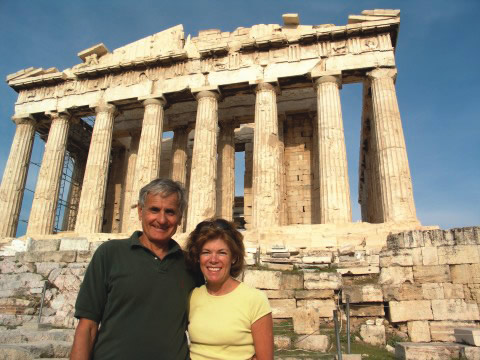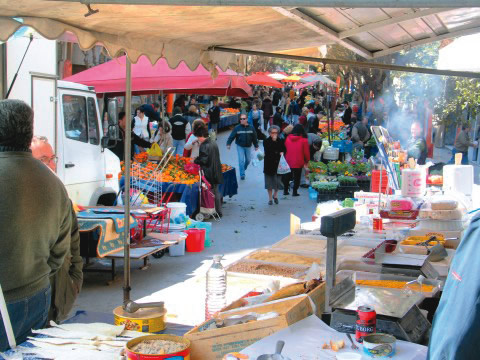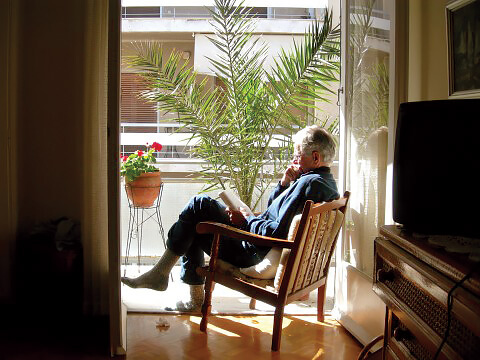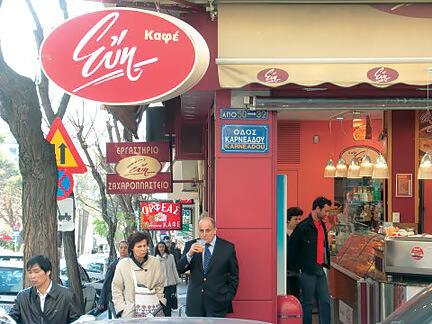Moving and Living in Athens for a Retirement Gap Year
Article & Photos by Eileen Pappas
 |
In front of the Parthenon after moving to Athens. |
My husband and I have just returned to our quiet mountain cabin after taking a “gap year” that introduced a new lifestyle to two worn-out retirees who had survived raising six children while managing careers.
We spent seven months in a high-density city with people high on caffeine and conversation. We were confronted with stimulation at every turn — from the harking of vendors at the street market that lined our neighborhood to the morning and
evening clanging of church bells, to the canaries that woke us each morning, to the accordion player who serenaded in the early evening.
It all began about 10 years ago when we watched our daughter fly off for her college year abroad in Hungary. During a visit filled with field trips and classes, we asked why couldn’t we have this experience? Watching
her find commonality with people foreign to our culture, manage a new language, sample the delights that this country offered while learning their history caused us to wonder what we were missing.
We decided to follow our passion: archaeology in the ancient world. This led us to choosing a place that is ground zero for classical studies: Athens, Greece.
We began the process by researching the cost of housing, travel, the euro, and day-to-day living expenses to create a budget. It immediately became obvious that to make this adventure financially comfortable we would need
to lease our condo in Denver. We decided to leave it furnished to avoid the hassle and cost of moving to storage. We advertised in one of the local newspapers and waited — never really expecting to hear from anyone. Then out of the blue a
couple called. We checked out their references and took a leap of faith.
Once we had the lease secured we scoured the Internet for apartments in Athens. Because we were familiar with the city, we concentrated on the Kolonaki area. Local English-speaking newspapers and real estate sites gave us
a good idea of what we would need to spend for accommodations that would fit our needs. However, we did not want to commit to a particular property until we were able to see it.
We transferred all our bills online, which we discovered was something we should have done a long time ago. We notified our bank and credit card companies of our plans. And we notified our family and friends of our plans.
But we avoided inviting people to join us because this was our own adventure.
We packed two suitcases each with light and heavy clothes. We also packed an extra suitcase with toiletries, books, and medications that would carry us through eight months. We figured this would preclude hunting the city
for our favorite brands.
Arriving in Athens, we checked into a hotel located in the area of town where we planned to live. But finding an apartment turned out to be much more difficult than we had anticipated. We scanned two newspapers and contacted
two real estate agents. It turned out our timing was very poor as the season for leasing apartments had just ended. There was not much for us to see — in any price range.
After looking at five apartments, we realized we would need a new set of “eyes” in choosing a place to live. Athenians are accustomed to living in much tighter quarters than we Americans are. The third-floor
apartment we chose belonged to a retired couple from Brooklyn who made the leasing process very easy. After signing the papers and writing the checks, we left our bags and took off for two weeks to explore an island off the Turkish coast. We
were ecstatic that we had a home and our adventure was beginning.
Once we returned to our “home,” however, the reality of what we had rented began to reveal itself. It had all the appropriate rooms — living room, formal dining room, kitchen, two bedrooms, one bathroom and
water closet, and balconies accessing all the major rooms. But, the kitchen was so tiny only one person could work in it at one time. It had a dishwasher that we never could figure out how to operate and a washing machine with a 2-hour cycle
but no clothes dryer — that’s what the back balcony was for. And the toilet leaked.
The bedroom sported two single beds that sagged in the middle and were open to the sounds of the street — cars and motorcycles revving up the hill at all times of day and night, cement mixers climbing past at midnight
to deliver loads to buildings being rehabbed. The sounds of the building included an upstairs artist tuning her piano at 2 a.m. as well as a next-door neighbor who thinks she’s Madonna.
Had we made a mistake? Or was I being just a spoiled American? I decided I had to embrace this environment and make the best of it.
Everything else was going so well. I found a volunteer position through a friend with the American School of Classical Studies. We were thrilled with the discovery of ancient sites. We sampled the freshest of foods from
the many restaurants and tavernas. And we thoroughly enjoyed just people watching.
 |
The weekly farmers’ market in the author’s neighborhood. |
New plants on the balcony shielded us from the outside view and gave us a sense of home. Next on the agenda was to fix the beds. While walking through our neighborhood we discovered a furniture store that made mattresses.
We ordered a king-size foam mattress to cover the twin beds, which made all the difference for sleeping. And we moved the beds to the back room away from the street, which stifled the noise considerably.
 |
Husband John relaxes in a sunny doorway of their Athens apartment. |
Our next challenge was acquiring visas to stay in Greece, as well as other EU countries, for more than three months. Because of my connection with the American School, I was able to use their facilitator to assist with this
process.
Now it was time to establish a life here in this very busy city. Creating a schedule would give us routine and help us meet people, which would provide a sense of security so needed in a foreign country. My volunteer project
gave me the opportunity to make many new friends and to meet my neighbors on the 5-minute walk to the school. It also led to lectures and field trips where we met the people who wrote the books we were reading. Playing tennis regularly at a local
tennis club introduced us to many interesting people, and attending exercise classes at a nearby gym kept me in shape. At the same time, exploring archaeology through travel was an important ingredient in this adventure; so we decided to take
a trip at least once a month that would broaden our focus on the ancient world.
 |
Locals in Athens enjoy their coffee breaks. |
Staying in touch with family and friends was easy. We joined an international phone service for $5 a month whereby we could be reached easily and the time used charged to our credit card. For our own phone calls we used
international calling cards purchased at kiosks for five to 10 cents a minute. We also used a local Internet café which was very easy to access, if you could stand the smoke.
Each week in Athens brought another strike — the garbage collectors, the ferries, the public transports, the bankers, you name it. We kept track of them through the local newspaper. The American work ethic hasn’t
reached these shores yet, which is evident as you stroll through squares lined with outdoor cafés populated by crowds at any hour of the day.
Most important was getting into the rhythm of the people. Learning their history, their present-day concerns, their language, and observing lifestyles helped us anticipate many situations. Grocery shopping was one of the
biggest challenges. Scanning labels with Greek writing required trying to translate the pictures to determine what was in the package. Cleaning products were the biggest mystery. You can always tell a culture by the amount of shelf space dedicated
to specific products. In this country cleaning products outrank all, except of course for cheese and all the varieties of bread.
People have responded to our trip with “I always wanted to do that.” All it takes is choosing a place, developing a budget, and planning a routine that will enhance your cultural experience. The biggest surprise
was how such an incredible dream could so easily become a reality. Our time abroad enriched our lives by giving us another dimension to these retirement years. As in the ancient Greek dramas, having these experiences and meeting these challenges
has set the stage for the next act.
See articles and resources at Living in Greece for more information.
Eileen Pappas, a former marketing consultant, has a master’s degree in advertising and has written for a variety of business publications. She and her husband traveled extensively while raising six
children. They reside in Denver and Westcliffe, CO. |
